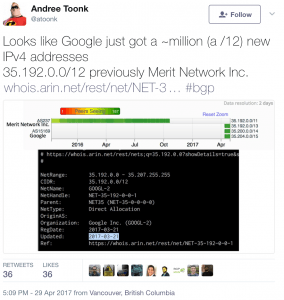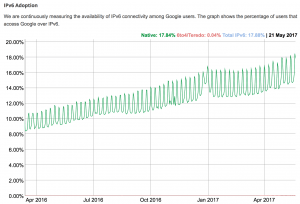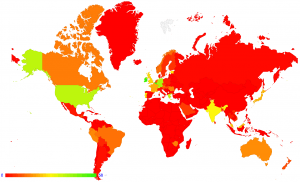As per the RIPE Stat – BGPlay, Merit Network Inc (AS237) withdrew its advertisement of 35.192.0.0/11 on 18 October 2016. It didn’t ring any bells because they have plenty of IPv4 address space, but on 21 March 2017, ARIN announced that 35.192.0.0/12 has been added to the transferred list.
 As no-one was advertising this block on the Internet, it was unclear who’d bought such a big block and at what price. On 29 April 2017, Andree Toonk (founder of BGPMon) tweeted about this announcement and surprisingly enough it was announced by Google.
As no-one was advertising this block on the Internet, it was unclear who’d bought such a big block and at what price. On 29 April 2017, Andree Toonk (founder of BGPMon) tweeted about this announcement and surprisingly enough it was announced by Google.
More digging in RIPE Stat – BGPlay suggests that Google started announcing 35.192.0.0/13, 35.200.0.0/14, 35.204.0.0/15 from AS15169 on 12 April 2017. As per the Whois information, Google has allocated this block for Google Cloud customers *** The IP addresses under this Org-ID are in use by Google Cloud customers ***
This transaction of more than a million IPv4 addresses started a debate why Google had to make this move when their IPv6 stats suggest that IPv6 deployment is increasing worldwide and most of their services are already available through IPv6.
The above graph from the Google IPv6 Statistics shows a growth of almost 7% in the last 12 months. This looks great but is that enough? The answer is of course not. Other statistics from the APNIC IPv6 Measurement Map show another side of IPv6 deployment status around the world. It is much better than previous years and it’s improving every month but is still not close to satisfactory.
Google has to serve its customers all around the world and if those customers don’t have IPv6 then they need to give them the option of IPv4. As rightly commented by Mark Smith on the AusNOG mailing list,
“The reason why I think Google buying the /12 is significant, despite Google services being thoroughly IPv6 enabled for quite a while, they’re not buying those IPv4 addresses to solve their own lack of IPv6 deployment. They’re trying to overcome others lack of IPv6 deployment, and paying a large amount of money to mostly solve somebody else’s problem rather than their own. I can only see them and others in a similar situation tolerating those costs for a limited time. They have a financial motivation to actively minimise or avoid those costs sooner rather than later.”
To summarise the discussion, whether it’s Google or any other major cloud or content provider, they can’t serve you IPv4 forever and may give up on you sooner or later. If you are an ISP not providing IPv6 to their customers then your customer will move to another ISP, and this is only a matter of time.
If you want to find out more about how to deploy IPv6 in your network, you can check out our IPv6 resources, attend any of our upcoming IPv6 training (workshop/tutorial) around the world, or reach out to us and let us know how can we help.


